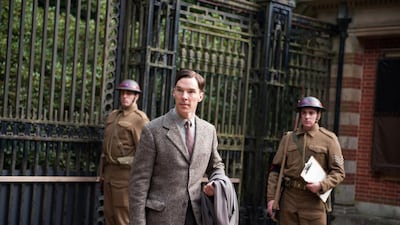In the Stephen Hawking biopic The Theory of Everything, there is a scene in which two college girls rush into a 1960s-era Cambridge party and the sight of the other attendees stops them in their tracks.
“Oh, dear,” one of the girls says. “Scientists.”
This could be the reaction from this year’s film-festival crowds, where two of the most lauded and talked-about films have been portraits of elite mathematical minds.
In The Theory of Everything, Eddie Redmayne plays the theoretical physicist Stephen Hawking and in The Imitation Game, Benedict Cumberbatch plays the British mathematician, Second World War code breaker and computer-science pioneer, Alan Turing.
After glowing receptions at the Toronto International Film Festival, both films are expected to be major players on Hollywood's awards circuit in the months ahead (The Theory of Everything is due for release on November 7 and The Imitation Game two weeks later).
Redmayne and Cumberbatch are already tipped by many pundits to be favourites to earn Best-Actor Oscar nominations.
"A lot of people talk about it as being a competitor to our film," Cumberbatch said of The Theory of Everything. "I don't like thinking of films being in competition with each other, full stop. It's absurd. As long as they're both able to find an audience, it's not a problem."
In an interesting twist, Cumberbatch – who is friends with Redmayne – has also portrayed Hawking, albeit on the small screen in a Bafta-nominated 2004 BBC film, until now the only Hawking biopic.
In The Theory of Everything, the director James Marsh – best known for the documentaries Man on Wire and Project Nim – portrays Hawking's scientific growth in tandem with his physical deterioration caused by a motor neuron disease. Redmayne plays Hawking through each step of the illness, transforming from a gawky young man to wheelchair-bound father of three.
“I attempted to read and comprehend as much as I possibly could of his work, which wasn’t very much,” Redmayne said.
The 32-year-old actor spent five months researching the role, and met Hawking shortly before filming began.
“I went in genuinely petrified,” said Redmayne. “I basically spent the first 25 minutes vomiting forth information about Stephen Hawking ... to Stephen Hawking.”
Such a meeting wasn’t possible for Cumberbatch with Turing, as the latter committed suicide in 1954. His role in breaking the Germans’ elaborate Enigma code – Winston Churchill described it as the single greatest contribution to the war effort – has only recently begun to be widely recognised.
But Turing's story – and The Imitation Game – is also about a man who was persecuted because of his personal life.
“Alan is, compared to his achievements, relatively obscure, which is one of the really shaming aspects of what happened to him,” says Cumberbatch.
Curiously, films about cold mathematics tend to be highly emotional, often verging on sentimentality – movies such as Good Will Hunting and Ron Howard's Oscar-winning A Beautiful Mind.
Rare is the film that delves deeply into numbers themselves – Darren Aronofsky's obsessive Pi is one of few examples.
Usually, the movies use maths for little more than handsome backgrounds of chalkboard equations and the – more comprehendible – personal lives behind the science.
A third film that was screened at Toronto, Ed Zwick's Pawn Sacrifice, dramatises the real-life battles between the American chess prodigy Bobby Fischer (Tobey Maguire) and the Soviet Union's Boris Spassky (Liev Schreiber). As a biopic of Fischer, it marvels at the kind of brain that can synthesise so many of the possible moves in chess, and the game's effect on Fischer's mental health.
“There are more 40-move games than stars in the galaxy,” says William Lombardy (Peter Sarsgaard), a Catholic priest and chess grandmaster, in the film. “This game can take you right to the edge.”
Playing such unique thinkers can be challenging to any actor, since their subject’s realm of thought is so unfathomable and mysterious. As he did when he played Hawking, Cumberbatch says he tried to “brush up” on his algebra when he took on the role of Turing.
“I’m not stupid, but I’m not that smart,” he says. “So I can at least lend something of that within the performance, like maybe the alacrity of thought, making fast connections. But when you actually start talking about the language, he used to get to those stunning conclusions, you might as well ask me to write my name in Mandarin. It’s a whole new world of alphabet and understanding.”
While portraying characters with such high IQs might be daunting, it can be even more so to sit in judgement of them.
The Theory of Everything screenwriter Anthony McCarten says they have already screened the film for Hawking. "His exact words were: 'Broadly true,' " he says. "We'll take that."

